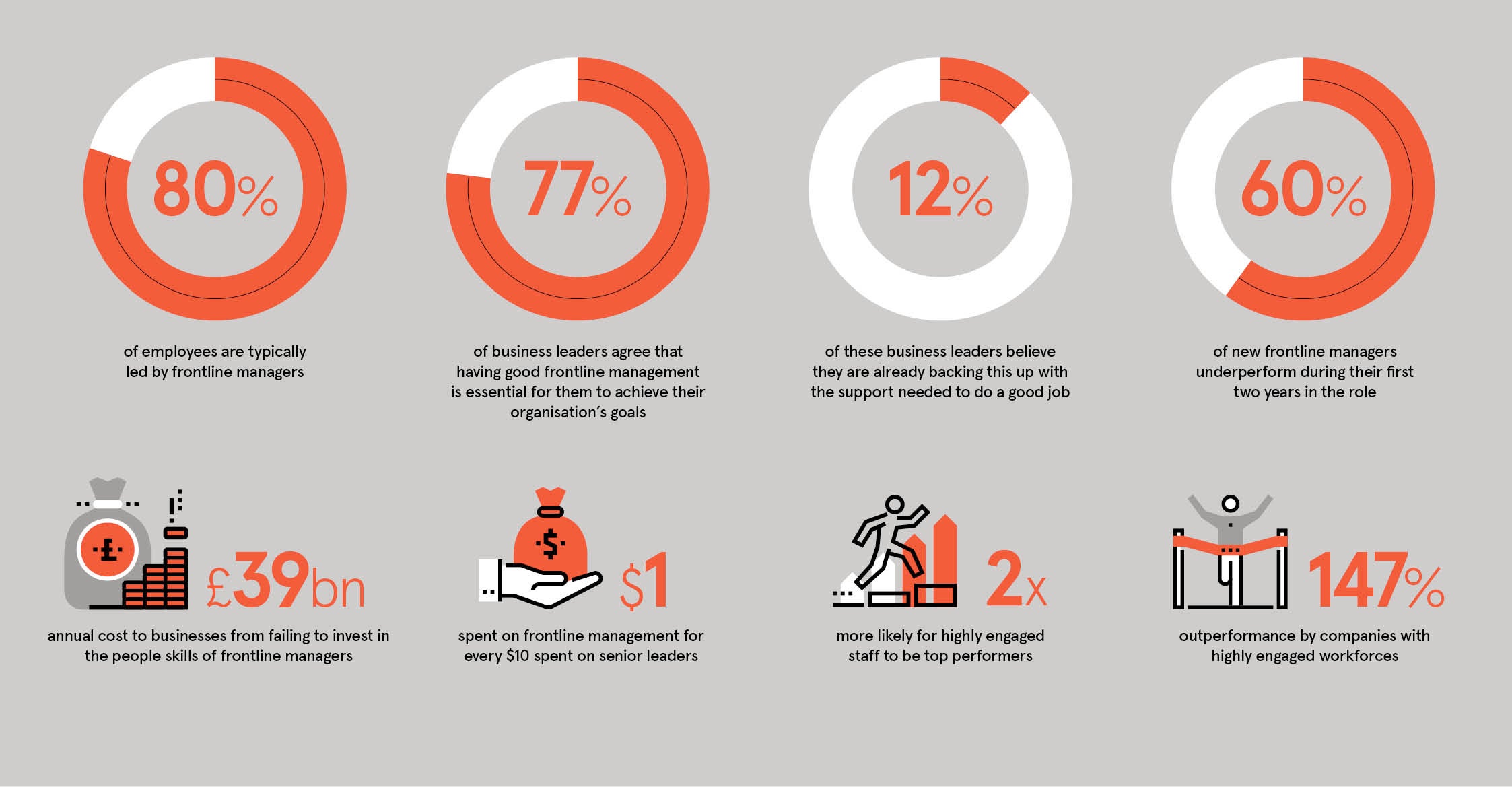
If there was a group of people in your company who you knew were mission critical, had the biggest impact on employee engagement, were an important driver of performance and integral to your overall success, would you make them a priority? Would you invest in their development and take steps to ensure they felt valued and empowered to make a difference in your business?
In large multi-site organisations, frontline managers typically lead more than 80 per cent of employees and the majority of people interacting with paying customers. In some places this number is far higher and frontline leaders regularly make up over half a company’s management population. Frontline manager performance and engagement is therefore pivotal to your success.
Frontline managers should be the real stars in organisations. They’re the day-to-day leaders, tasked with being the conduits between the C-suite and the employees who bring company values to life with customers every day. A recent Harvard Business Review poll found that 77 per cent of business leaders agreed that having good frontline management was essential for them achieving their organisational goals.

But this same research also revealed a more startling truth that despite claiming to understand their value, only 12 per cent believed they were backing this up with the support needed to do a good job. This gap is simply too important to ignore.
Frontline managers are too rarely given sufficient tools and support to lead, engage and inspire their people. Most organisations know the benefit of good frontline management and their impact on the performance of their staff, it’s just that somehow they’re too far from the action to know what their managers’ needs are and the worlds in which they’re being expected to manage.
Rather than provide ongoing engagement and support, many firms “hit and hope” by providing only basic training to ensure operational delivery, and leaving critical factors such as effective leadership, performance management and communication to chance. Unsurprisingly, a survey by the University of the West of England, Bristol found that 60 per cent of new frontline managers underperformed during their first two years in the role.
Why take this risk? They might be frontline managers in name, but without the right support, they’ll be hardly managing at all. A lack of effective engagement can have a hugely damaging impact on managers’ own sense of wellbeing and conspires against UK productivity rates, retention and their people’s willingness to go the extra mile. It costs businesses dear, to the tune of £39 billion each year, according to Investors in People.
Frontline managers are too rarely given sufficient tools and support to lead, engage and inspire their people
Support the people who spend the most time with staff
For us, it stands to reason that if businesses want to boost the engagement of their workforce as a whole, they need to take a step back, and spend time re-engaging and developing the managers who lead their customer-facing people.
Too often, development budgets still head north, aimed at those at the very top. It’s a throwback to a still-dominant belief that leadership flows from the top, even though few chief executives are able to engage directly with their frontline staff every day. We say challenge this, dismiss it, and focus instead on supporting frontline teams to bring a brand’s values to life in its marketplace and deliver the C-suite’s commercial goals through the way they serve their customers.
Great frontline managers “connect” with their people, so what managers really need is bolstering. They need to feel re-energised and reconnected with the organisation again. At the moment far too many organisations rely on line-manager goodwill. But it runs out. Far more sustainable is when managers are tooled with confidence, when they feel valued, in control, and have a deep belief in themselves and their ability to make a difference.
Frontline managers need to find their passion again, their vigour, their verve, because when they do the results can be remarkable. Engaged frontline managers are not only more fun to work with, but they inspire loyalty and their own performance rubs off on those they support.
Research shows getting to know staff on a personal level can help boost employee engagement by as much as 11 per cent. Organisations with highly engaged staff report that these people are twice as likely to be top performers and miss 20 per cent fewer days’ work. Numerous studies, especially those by Gallup, reveal the strong link between employee engagement and productivity. Companies with highly engaged workforces outperform their peers by 147 per cent.
With statistics like these, it’s seems crazy that many training budgets still focus on executive development rather than the managers leading the most people. Data shows that for every $10 spent on senior leaders, just $1 is spent on frontline management.
In most places, this approach isn’t working and to us it really is simple. If your brand really matters to you and you want your employees to be highly engaged brand ambassadors, then the people that matter most are your frontline leaders. Organisations deserve and need something better. They need empowered frontline managers who can create a genuine sense of engagement from their staff that can be felt every day.
Frontline managers matter. Engage these overworked and often underappreciated people first, and they’ll repay you by engaging the rest of your organisation effortlessly and almost by default. And in doing so, your frontline leaders will unlock their own potential, the potential of others and ultimately the potential of your business.
It really shouldn’t be such a difficult thing to do, should it?
For more information please visit nsu.media


